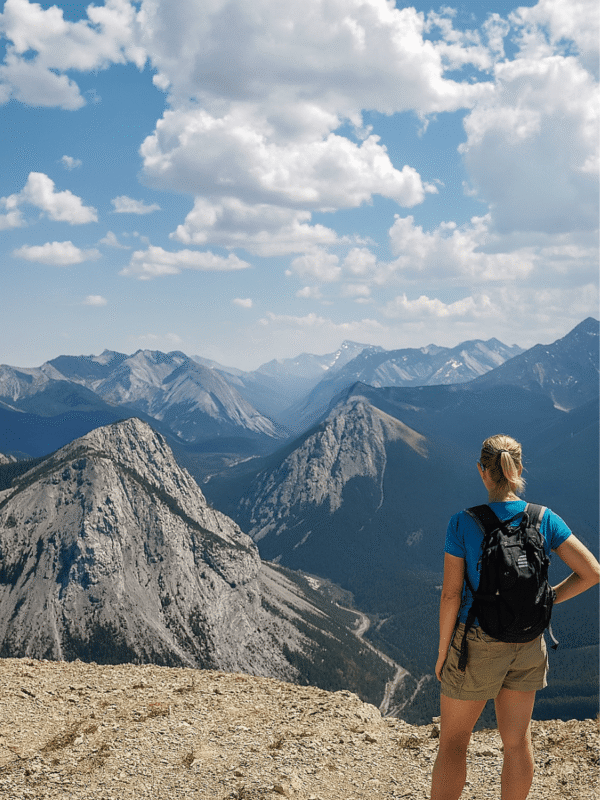Skyline Trail Alberta: Your Complete Guide to Canada’s Most Epic Alpine Adventure 2025
📘 Table of Contents
What is the Skyline Trail Alberta?
The Skyline Trail Alberta is a 2-4 day hike from the Maligne Lake trailhead to the bottom of Signal Mountain, with three main challenging passes and boasting the highest section of hiking trail in Jasper National Park. This iconic backpacking route offers unparalleled alpine experiences across the Canadian Rockies.
- Extends 44 kilometres through pristine wilderness
- Features 25 kilometres of above-treeline hiking
- Crosses three major mountain passes
- Provides six designated backcountry campgrounds
- Showcases panoramic views of surrounding peaks
The trail’s reputation stems from its exceptional combination of accessible alpine terrain and dramatic mountain scenery. Unlike many high-altitude routes requiring technical climbing skills, the Skyline Trail Alberta welcomes experienced backpackers with well-maintained paths and established camping facilities. The route traverses some of Canada’s most photogenic landscapes, making it a bucket-list destination for serious hikers. Many consider it the crown jewel of Jasper National Park’s extensive trail network.
💡 Pro Tip
Book your backcountry camping permits well in advance, especially for peak summer months. The trail’s popularity means reservations fill quickly once they open in January.
Where is the Skyline Trail Located in Alberta?
The Skyline Trail Alberta sits within Jasper National Park in the heart of the Canadian Rockies. The trailhead begins at Maligne Lake, approximately 48 kilometres southeast of Jasper townsite, and concludes at the Maligne Canyon parking area near the town.
- Starting point: Maligne Lake parking area (elevation 1,673m)
- Ending point: Signal Mountain/Maligne Canyon area
- Geographic coordinates: 52.6781° N, 117.5717° W
- Distance from Calgary: 365 kilometres (4.5 hours driving)
- Distance from Edmonton: 350 kilometres (4 hours driving)
Access to the trailhead requires driving the scenic Maligne Lake Road, which winds through spectacular mountain landscapes. The road remains open year-round, though winter conditions may require appropriate vehicle equipment. Ample parking exists at Maligne Lake during hiking season, but arriving early is recommended during peak periods. The location within Jasper National Park means hikers enjoy the protection and infrastructure of one of Canada’s premier wilderness preserves.
For those seeking advanced trail planning tools, modern technology can help optimize your Skyline Trail Alberta experience with detailed route mapping and weather forecasting.
How Long is the Skyline Trail Alberta?
The Skyline Trail spans 44 kilometres of diverse mountain terrain, typically completed over 2-4 days depending on hiking pace and chosen itinerary. Most backpackers plan a 3-day, 2-night adventure to fully appreciate the spectacular alpine environment.
- Total distance: 44 kilometres (27.3 miles)
- Typical duration: 2-4 days
- Daily hiking distance: 10-22 kilometres per day
- Elevation gain: Approximately 1,480 metres total
- Above-treeline exposure: 25 kilometres
The trail’s length allows for flexible itinerary planning based on experience level and desired pace. Stronger hikers might complete the route in two intensive days, while others prefer a leisurely four-day schedule with shorter daily distances. The six available campgrounds provide strategic stopping points for overnight stays. Weather conditions significantly impact hiking times, as exposed alpine sections can become challenging during storms or high winds.
📝 Planning Note
Plan for 8-12 hours of hiking per day including rest stops. The exposed alpine terrain requires early starts to avoid afternoon thunderstorms.
When is the Best Time to Hike the Skyline Trail Alberta?
July through September is the best time to hike the Skyline Trail, when snow has cleared from alpine sections and weather conditions remain most stable. Peak season offers optimal trail conditions but requires advance planning for permits and accommodation.
- Prime season: Mid-July to mid-September
- Snow clearance: Usually complete by mid-July
- Peak crowds: Late July through August
- Shoulder seasons: Early July and late September
- Weather risks: Thunderstorms and early snow possible
Early season hiking presents challenges with lingering snow patches and muddy trail conditions, while late season brings risks of unexpected snowfall and rapidly changing weather. Mid-August typically provides the most reliable conditions with fully melted snow, established trail conditions, and relatively stable weather patterns. The best times to visit this trail are May through October, though May and October require extra preparation for variable conditions.
Smart hikers leverage advanced weather prediction tools to time their Skyline Trail Alberta adventure perfectly, ensuring optimal conditions for this once-in-a-lifetime experience.
What Makes the Skyline Trail Alberta Challenging?
The Skyline Trail Alberta presents significant challenges through extended alpine exposure, unpredictable mountain weather, and demanding physical requirements. Jasper’s skyline trail is also famous for its challenging weather, requiring hikers to prepare for rapidly changing conditions above treeline.
- Extended exposure above treeline (25 kilometres)
- Three major mountain passes to navigate
- Elevation changes totaling 1,480 metres
- Unpredictable alpine weather systems
- Multi-day backpacking endurance requirements
- Navigation challenges in poor visibility
The trail’s difficulty stems primarily from its alpine nature, where weather can change from sunny skies to dangerous storms within hours. The extensive above-treeline sections offer no shelter from wind, rain, or lightning, making proper gear and timing crucial for safety. Physical demands include carrying multi-day backpacking loads across varied terrain with significant elevation changes. Navigation skills become essential during poor weather conditions when visibility drops and trail markers become difficult to locate.
⚠️ Safety Alert
Never attempt the Skyline Trail Alberta without proper alpine experience, quality gear, and favorable weather forecasts. The exposed terrain offers no shelter during storms.
Do You Need Permits for the Skyline Trail Alberta?
Yes, all overnight hiking on the Skyline Trail Alberta requires valid backcountry camping permits from Parks Canada. Reservations can be made by calling 1-877-RESERVE (1-877-737-3783) beginning at 8 AM MST on January 29, 2025, or through the official Parks Canada website.
- Backcountry camping permit: Required for all overnight stays
- Reservation system opens: January 29, 2025
- Booking window: Up to 90 days in advance
- Permit fees: $10 per person per night
- Group size limits: Maximum 6 people per party
- Campground assignments: Must specify exact locations
Permit demand significantly exceeds availability during peak season, making early booking essential for preferred dates. The reservation system allows hikers to select specific campgrounds along the route, enabling flexible itinerary planning. Day hiking portions of the trail requires only a valid Jasper National Park entry pass, but overnight camping anywhere in the backcountry mandates proper permits. Cancellation policies allow some flexibility for weather-related changes, though fees may apply.
Modern adventurers can streamline their planning process using AI-powered trip planning tools to coordinate permits, gear, and logistics for their Skyline Trail Alberta expedition.
What Essential Gear Do You Need for the Skyline Trail Alberta?
Success on the Skyline Trail Alberta depends on quality gear suitable for alpine conditions, unpredictable weather, and multi-day backpacking. Essential equipment includes shelter, insulation, navigation tools, and safety gear designed for mountain environments.
🧰 Essential Gear Categories
- Shelter System — 4-season tent capable of handling high winds and potential snow. MSR Hubba Hubba NX 1-Person Tent
- Sleep System — Sleeping bag rated to -5°C minimum, insulated sleeping pad. Marmot Trestles Elite Eco 20 Sleeping Bag
- Clothing Layers — Merino wool base layers, insulating mid-layer, waterproof shell jacket and pants
- Navigation — GPS device, detailed topographic maps, compass, emergency whistle
- Safety Equipment — First aid kit, emergency shelter, headlamp with extra batteries
- Cooking System — Lightweight stove, fuel, cookware suitable for group size
Quality gear becomes crucial given the trail’s alpine exposure and potential for rapidly changing weather conditions. Weight considerations are important for multi-day backpacking, but safety and functionality must never be compromised for lighter gear. Many experienced hikers recommend testing all equipment on shorter trips before attempting the Skyline Trail Alberta. Proper layering systems allow adaptation to temperature swings from hot sunny conditions to near-freezing nighttime temperatures.
💡 Gear Tip
Pack extra insulation and weatherproof layers beyond what seems necessary. Alpine conditions change rapidly, and being over-prepared is safer than being caught unprepared above treeline.
Ready to Conquer the Skyline Trail Alberta?
The Skyline Trail Alberta represents the ultimate Canadian Rockies backpacking adventure, combining spectacular alpine scenery with challenging but achievable hiking. From the moment you step onto the trail at Maligne Lake until you complete the journey at Signal Mountain, every kilometre offers unforgettable mountain experiences. Proper planning, quality gear, and respect for alpine conditions ensure a safe and rewarding adventure on this legendary trail.
Start planning your Skyline Trail Alberta expedition today by securing permits, assembling proper gear, and building the fitness required for this incredible journey. The mountains are calling—will you answer?
📢 Start Planning Your Adventure
Ready to tackle the Skyline Trail Alberta? Begin by checking current permit availability and weather conditions. Remember, the best adventures require the best preparation!
Affiliate Disclosure
Some links in this post may be affiliate links. As an Amazon Associate and partner with other programs, I may earn a commission if you make a purchase, at no extra cost to you. I only recommend tools and gear I believe in.

